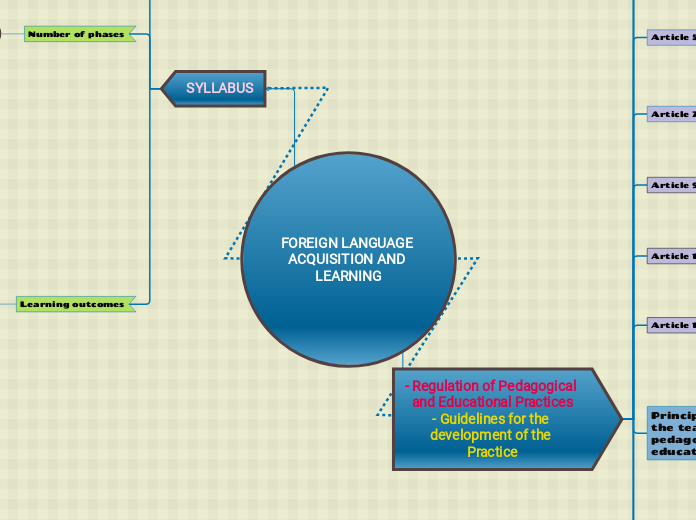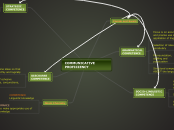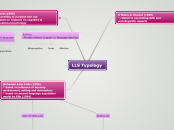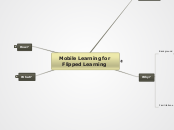FOREIGN LANGUAGE ACQUISITION AND LEARNING
Figure out new words by learning about the individual meanings of suffixes and prefixes.
SYLLABUS
Do you know what a 'prefix' is?
A prefix is an affix placed before a word, base, or another prefix to modify a term's meaning.
Learning outcomes
Learning outcomes 5
Set up a proposal related to the new assessment approaches in the classroom
environment.
Learning outcomes 4
Evaluate teaching strategies used within the classroom based on the student's
learning characteristics.
The prefix 'fore-' means 'before'.
Type in several words that start with this prefix.
Example: foresee.
Learning outcomes 3
Compare the main theories on foreign language acquisition within the context of the
pedagogical practice scenario.
Learning outcomes 2
Examine the factors that influence the process of foreign language acquisition and learning methodically and in detail within the pedagogical practice scenarios.
The meaning of the prefix 'pre-' is 'before'.
Type in several words that start with 'pre-'.
Example: prehistoric.
Learning outcomes 1
The prefix 'post-' means 'after', 'later'.
Type in several words that use it.
Example: postpone.
Number of phases
PHASE 5
Final Activity
PHASE 4
Practical component - participant - observation practice
3 hours for ESAPEC
3 hours for E-portfolio
3 hours for Simulated Scenario
PHASE 3
The prefix 'pro-' means 'favor', 'progress'.
Type in several words that start with 'pro-'.
Example: proactive.
8 hours (Participant Observation Practice)
2 hours (Material Development)
PHASE 2
Participant - observation practice
The prefix 'con-' means 'with', 'together'.
List a couple of words that use this prefix.
Example: contraction.
8 hours (Participant Observation Practice)
2 hours (Material Development)
3 hours (ESAPEC)
PHASE 1
Recognition Activity
The prefix 'co-' means 'together'.
List a couple of words that use this prefix.
Example: coexist.
Review the characteristics of the course and the particularities of the pedagogical and educational practice process.
Contents
UNIT 2
Learning trends in a foreign language
The 'a/an-' prefixes mean 'not', 'without'.
List a couple of words that use these prefixes.
Example: amoral.
UNIT 1
Foreign language acquisition from the theory to the practice
The prefix 'non-' means 'not'.
Type in several words that start with this prefix.
Example: nonviolent.
- Regulation of Pedagogical and Educational Practices
- Guidelines for the development of the Practice
Do you know what a 'suffix' is?
A suffix is an affix placed at the end of the root word, which can change its tense and/or meaning.
SIMULATOR
Allows an exercise of innovation that recognizes the space of experience as a starting point for reflection on what to do as a teacher and the various situations that educational contexts present.
ESAPEC
It consists of a certain number of synchronous accompaniments to groups of practicing students, in the interaction between the teachers and the ECEDU practice accompaniment teachers of each course, as established by the pedagogical and didactic criteria of each course and in correspondence with the number of face-to-face hours in the practice setting.
Pre-practice seminar
PERIOD 10
Research: ICT-mediated educational practices and pedagogical practice in online environments
PERIOD 9
Investigation: Educational research and research pedagogical practice
PERIOD 8
Immersion: Technology in foreign language teaching and Integral pedagogical practice
PERIOD 7
Immersion: Testing and evaluation in ELT and Teacher development
PERIOD 6
Immersion: Curricular approaches, and teaching English to adolescent children and adults
The suffix '-ment' refers to an action or process.
Type in several words that end in
'-ment'.
Example: movement.
PERIOD 5
Observation: Evaluation, and methodology in foreign language teaching
The suffixes '-ize/yze' mean 'to make' or 'full of'.
List a couple of words that end in '-ize/yze'.
Example: socialize.
PERIOD 4
Observation: Didactics in English, foreign language acquisition, and learning
The suffix '-al' refers to an action or a process.
Type in several words that use this suffix.
Example: maternal.
The pre-practice seminar seeks reflection and understanding of pedagogical and educational practices by the teacher in training and administrative enlistment.
Principles of action of the teacher in training in pedagogical and educational practice:
Excellence in service
Respect for differences
Promotion of protective environments
Dialogicity between educational actors
Integrality of the teaching pedagogical practice.
Article 13
The activities are compulsorily carried out in the practice scenario defined and assigned by the pedagogical and educational practices team.
Article 11 - 12
Courses of the training route of pedagogical and educational practice: The courses are offered over periods of 16 weeks, under the criteria of the program leader.
Article 9 - 10
Course enrollment: Courses must be enrolled respecting the prerequisites of the study plan and the strict order established.
Article 7 - 8
Teacher in training: Advances and plans academic and training activities, in order to acquire skills, quality standards, and own learning results.
Formative route of pedagogical and educational practice: It is the curricular route of the practical components of the degrees, through participant observation, intervention, and research.
Article 5 - 6
Nature and offer of the courses of the practical component: The training course of the pedagogical and educational practice - PPE of the degrees, is made up of practical and methodological courses.
Article 3 - 4
Practical component Set of norms and guidelines stipulated by each school or program.
Pedagogical and educational practice: training strategy that articulates the knowledge and practices of the teacher, from participant observation, immersion and research.
Article 1 - 2
Definition: Set of norms and guidelines stipulated by each school or program.
Purpose: Conditions and provisions that guide and regulate the development of pedagogical practice activities.
The suffix '-ing' suggests the present participle.
Type in several words that end in
'-ing'.
Example: snowing.
Bachelor's Program in: ECEDU
Bachelor's in Children's Pedagogy
Bachelor of Mathematics
Bachelor's in Foreign Languages with an Emphasis on English
Bachelor of Philosophy
Bachelor of Ethnoeducation









